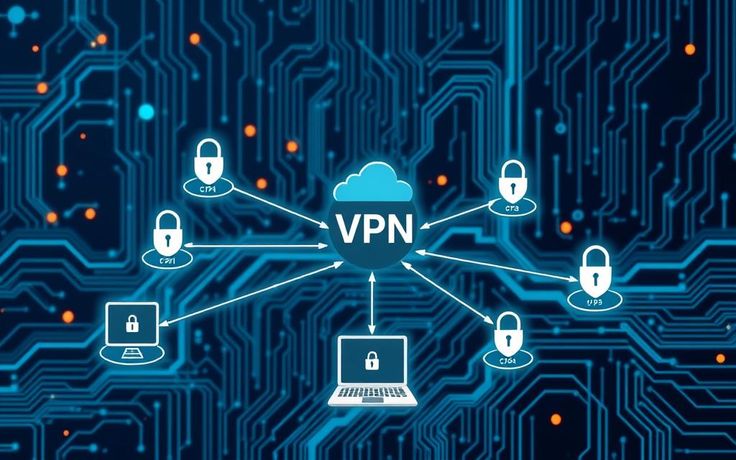
Online VPN: A Safe Way to Protect Your Privacy on the Internet
Have you ever felt uneasy when using public Wi-Fi at a café or airport? Or perhaps you’ve tried to access a website that’s blocked in your area? This is where an online VPN comes in — a smart solution to maintain your privacy and freedom on the internet.
In today’s increasingly connected digital era, protecting personal data is more crucial than ever. Many internet users now rely on VPNs — or Virtual Private Networks — to keep their online activities secure from third parties. This article will explain what a VPN is, how it works, and how it differs from a VPN proxy, so you can choose the service that best fits your needs.
What Is an Online VPN?
An online VPN is a virtual network service that allows you to connect to the internet through a remote server located in another country. This hides your real IP address and identity, making your online activities more secure and anonymous.
When you browse the internet without a VPN, your data can be seen by your Internet Service Provider (ISP) or even hackers on public networks. However, with a VPN, that data is encrypted, meaning it’s converted into unreadable code that only you and the intended server can understand.
Beyond enhancing security, VPNs also let you access content blocked in certain regions — such as streaming sites, games, or social media platforms unavailable in your country.
How a VPN Works: Protecting Data Through Encryption
When you activate an online VPN, the VPN application creates a “secure tunnel” between your device and the VPN server. All the data passing through this tunnel is encrypted, turning it into secret code that outsiders can’t decipher.
The VPN server then forwards your request to the website you’re trying to visit. That website only sees the VPN server’s IP address — not your real one.
In essence, a VPN acts as both a digital identity shield and a barrier against online tracking.
Benefits of Using an Online VPN
Using a VPN isn’t just about bypassing blocked websites — it’s a vital part of protecting your privacy and digital safety. Here are some of its key benefits:
Protects User Privacy
By hiding your real IP address and location, VPNs prevent websites, advertisers, and hackers from tracking your activity.
Access Global Content
VPNs let you access streaming services, news sites, and apps that are restricted by geographic location.
Security on Public Networks
When connected to public Wi-Fi, a VPN keeps your data — including passwords and private messages — safe from eavesdroppers.
Avoid Internet Throttling
Some ISPs deliberately slow down certain types of traffic. A VPN prevents this because your ISP can’t see what you’re doing online.
VPN vs. VPN Proxy: What’s the Difference?
Many people mistake a VPN proxy for a full VPN, but the two differ significantly in function and security.
A VPN proxy only hides your IP address — it doesn’t encrypt your data. This means third parties can still track your activity. Proxies are fine for simple tasks like accessing blocked websites but aren’t secure for sensitive use.
A VPN, on the other hand, provides full protection through strong encryption. It securely routes all your traffic, making it ideal for online banking, remote work, or browsing over public Wi-Fi.
If you want complete security, a VPN is the better choice compared to a proxy.
Tips for Choosing the Best Online VPN
With so many VPN services available, choosing the right one can be tricky. Here are some tips to help you decide:
- Check the privacy policy: Choose a VPN that has a strict no-logs policy.
- Server locations: The more server locations available, the more options you have for accessing global content.
- Connection speed: Ensure the VPN offers fast connections for smooth browsing and streaming.
- Multi-platform support: Pick a VPN that works across devices like laptops, smartphones, and tablets.
- Free trial or money-back guarantee: Test the service before committing to a paid plan.
Is a VPN Safe to Use?
Generally, VPNs are safe — as long as you use a trusted provider. Be wary of free VPNs with unclear origins, as some may collect and sell user data to third parties.
A high-quality VPN, however, does the opposite: it protects you from digital threats, especially when working remotely or conducting online transactions. The level of safety ultimately depends on the provider you choose.
Conclusion
In a world where online privacy is constantly at risk, an online VPN is a smart and effective way to protect yourself while surfing the web. With strong encryption and IP masking, a VPN keeps your data safe from hackers and trackers.
While VPN proxies offer a quick fix for accessing blocked content, they don’t provide the same level of security as a full VPN. If you value privacy, freedom, and digital safety, using a VPN is one of the best steps you can take — starting today.
Reference
Putra, I. G. K. G., & Santoso, H. B. (2025). Peran VPN dalam Menjaga Privasi Pengguna Jaringan Publik. Jurnal Informatika dan Teknologi Komputer (JITEK), 5(1), 27-33. https://doi.org/10.55606/jitek.v5i1.5834
Fenjan, A. (2023). Analysis of Privacy and Anonymity in VPN Services. International Journal of Research and Engineering Science, 11(8), 199-203.

